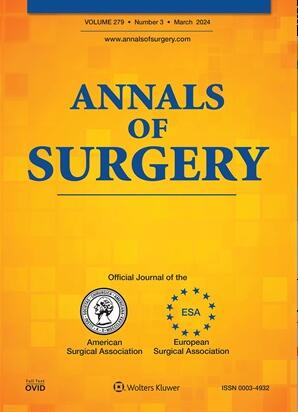Perspectives of Older Adults Undergoing Elective Major Surgery: A Qualitative Study of Patients Undergoing Colectomy.
IF 7.5
1区 医学
Q1 SURGERY
引用次数: 0
Abstract
OBJECTIVE Understand challenges faced by older adults who undergo elective major surgery. BACKGROUND Preparation for and recovery from elective major surgery is often described from clinician perspectives, limiting insights into older patients' experiences. METHODS We conducted a qualitative study with adults age 65+ years, 30-90 days post colectomy, using interviews and surveys at a Northeastern U.S. tertiary surgical clinic. Guided by a modified Framework method, we arranged data into domains, themes and subthemes. We categorized patient-identified challenges using the Geriatric 5 Ms framework as deductive themes. Then, we identified additional themes and subthemes inductively. RESULTS From November 2022 to August 2023, twenty patients completed the study. Themes of personal patient challenges included: the mind (i.e., coping with uncertainty, anxiety/frustration, and underappreciated cognitive challenges), mobility (i.e., physical limitations and challenges completing activities of daily living), medications (i.e., understanding medication frequency and side effects), multi-complexity (i.e., surgical recovery in the context of multi-morbidity), and what matters most (i.e., matters related to self, care-partners, and recovery expectations). Themes of process characteristics included challenges discussing the decision for surgery, understanding expectations for surgical recovery, and obtaining anticipatory guidance. Patients with fecal ostomy described heightened emotional challenges and social support needs. CONCLUSIONS Modifiable challenges older adult patients perceive after elective major surgery often stemmed from perioperative anxiety, uncertainty, inadequate communication and insufficient social support. These findings can guide clinicians in optimizing surgical care and inform future research developing interventions aimed at addressing emotional stressors and enhancing communication between patients and surgical teams.老年人择期大手术的观点:一项结肠切除术患者的定性研究。
目的了解老年人择期大手术面临的挑战。背景:择期大手术的准备和恢复通常是从临床医生的角度来描述的,这限制了对老年患者经历的了解。方法:我们对美国东北部一家三级外科诊所的65岁以上、结肠切除术后30-90天的成年人进行了一项定性研究。在改进的框架方法的指导下,我们将数据排列到域、主题和子主题中。我们使用老年5 Ms框架作为演绎主题对患者识别的挑战进行分类。然后,我们归纳地确定了附加主题和副主题。结果从2022年11月到2023年8月,20名患者完成了研究。患者个人挑战的主题包括:心理(即应对不确定性、焦虑/沮丧和未被重视的认知挑战)、活动能力(即身体限制和完成日常生活活动的挑战)、药物(即了解药物频率和副作用)、多重复杂性(即在多种疾病背景下的手术恢复)和最重要的(即与自我、护理伙伴和康复期望相关的问题)。过程特征的主题包括讨论手术决定的挑战,了解手术恢复的期望,以及获得预期的指导。粪便造口术患者描述了更高的情感挑战和社会支持需求。结论老年患者择期大手术后面临的主要挑战为围手术期焦虑、不确定性、沟通不足和社会支持不足。这些发现可以指导临床医生优化手术护理,并为未来研究开发旨在解决情绪压力源和加强患者与手术团队之间沟通的干预措施提供信息。
本文章由计算机程序翻译,如有差异,请以英文原文为准。
求助全文
约1分钟内获得全文
求助全文
来源期刊

Annals of surgery
医学-外科
CiteScore
14.40
自引率
4.40%
发文量
687
审稿时长
4 months
期刊介绍:
The Annals of Surgery is a renowned surgery journal, recognized globally for its extensive scholarly references. It serves as a valuable resource for the international medical community by disseminating knowledge regarding important developments in surgical science and practice. Surgeons regularly turn to the Annals of Surgery to stay updated on innovative practices and techniques. The journal also offers special editorial features such as "Advances in Surgical Technique," offering timely coverage of ongoing clinical issues. Additionally, the journal publishes monthly review articles that address the latest concerns in surgical practice.
 求助内容:
求助内容: 应助结果提醒方式:
应助结果提醒方式:


